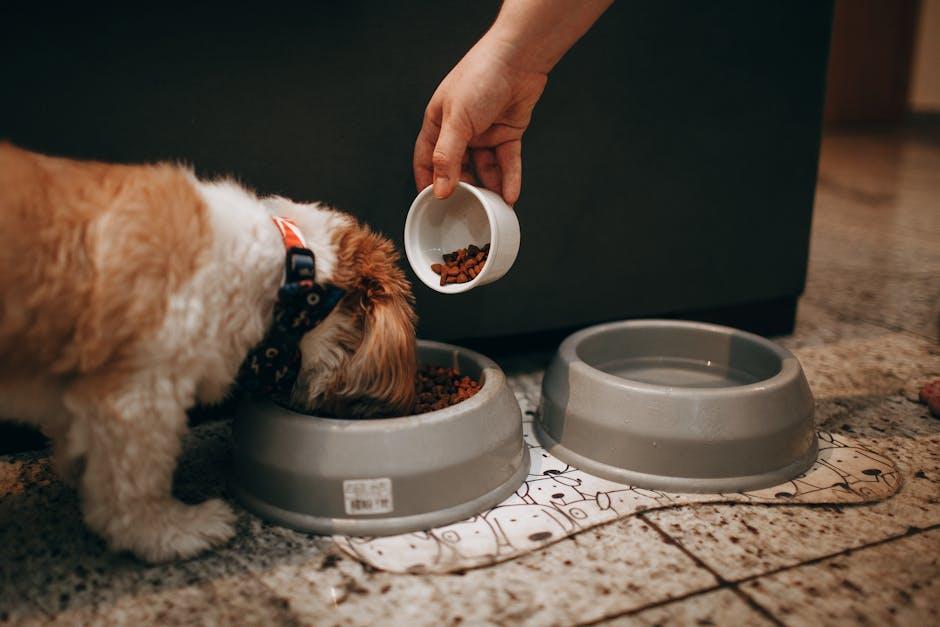Welcoming a puppy into your home is an exciting and heartwarming experience, filled with playful antics and wagging tails. As a new pet parent, one of your most important responsibilities is ensuring your furry friend grows up healthy and strong. A balanced diet is the cornerstone of your puppy’s well-being, providing the essential nutrients needed for growth, energy, and overall health. This year, embark on a journey to understand the intricacies of canine nutrition and discover how to tailor a diet that meets your puppy’s unique needs. In this guide, we’ll explore the fundamentals of puppy nutrition, offering practical tips and advice to help you create a meal plan that supports your puppy’s development and sets the foundation for a long, vibrant life. Whether you’re a first-time pet owner or an experienced dog lover, this article will equip you with the knowledge to nurture your puppy with love and the right nutrition.
Understanding Your Puppys Nutritional Needs
Ensuring your puppy’s diet is balanced requires understanding the specific nutrients essential for their growth and development. Puppies need more than just a bowl of kibble; they require a blend of proteins, fats, carbohydrates, vitamins, and minerals to thrive. Here’s a quick breakdown of what to include:
- Proteins: These are the building blocks of your puppy’s body, crucial for muscle development and tissue repair. Look for high-quality sources like chicken, beef, or fish.
- Fats: Essential for energy and supporting brain health, fats should be derived from natural sources like fish oil or flaxseed.
- Carbohydrates: Providing the energy needed for play and growth, choose wholesome grains or vegetables such as sweet potatoes and carrots.
- Vitamins and Minerals: Critical for immune function and overall health, these can be sourced from fruits, vegetables, and supplements tailored for puppies.
Remember, every puppy is unique, so it’s important to tailor their diet to their specific breed, size, and activity level. Regularly consulting with a veterinarian will ensure you’re meeting all their nutritional needs and helping them grow into healthy, happy dogs.
Choosing the Right Foods for Each Growth Stage
Understanding the dietary needs of your puppy at various stages of growth is crucial for ensuring their health and vitality. As puppies grow, their nutritional requirements evolve, necessitating adjustments in their diet to support their development. Here’s how you can tailor your puppy’s diet to suit each growth phase:
- Early Puppyhood (0-3 months): During this stage, your puppy needs a diet rich in high-quality proteins and fats to fuel rapid growth and brain development. Look for puppy formulas specifically designed for this age, which typically contain DHA for cognitive development and a balanced blend of essential nutrients.
- Juvenile Stage (3-12 months): As your puppy transitions into this phase, maintaining a balanced intake of proteins, fats, and carbohydrates becomes essential. Consider incorporating calcium and phosphorus for healthy bone growth and joint support. Monitor their weight and adjust portions to prevent overfeeding, which can lead to obesity.
- Adolescent Stage (12-18 months): By now, your puppy’s growth rate will slow down, and their dietary focus should shift towards maintaining a healthy weight and supporting sustained energy levels. Transition to a high-quality adult dog food that suits their breed size and activity level, ensuring it continues to provide a complete nutritional profile.
Each phase of your puppy’s growth brings unique nutritional challenges and opportunities. By understanding and meeting these needs, you set the stage for a lifetime of health and happiness for your furry friend.

Incorporating Treats Without Overindulging
Treats are a delightful way to reward your puppy and reinforce positive behavior, but balance is key to ensuring they remain a healthy part of their diet. Start by selecting nutritious treats that complement their regular meals. Opt for options with natural ingredients and avoid those with excessive sugars or artificial additives. Remember, treats should make up no more than 10% of your puppy’s daily caloric intake. This ensures that their main meals remain the primary source of essential nutrients.
- Size Matters: Choose treats that are appropriate for your puppy’s size and age. Smaller, bite-sized pieces work best for training and can help prevent overfeeding.
- Mix It Up: Incorporate a variety of treats to keep your puppy engaged and excited. You can alternate between crunchy biscuits, soft chews, and even homemade options like small bits of cooked chicken or carrot sticks.
- Interactive Feeding: Use treat-dispensing toys to stimulate your puppy mentally and physically, turning treat time into a fun and rewarding game.

Monitoring and Adjusting Your Puppys Diet
Just like humans, puppies have individual dietary needs that can change as they grow. It’s important to regularly monitor your puppy’s weight and energy levels to ensure they are on the right nutritional track. Look for signs like a shiny coat, bright eyes, and playful behavior. These are good indicators of a balanced diet. If you notice any issues, such as weight loss or lethargy, it might be time to adjust their food intake or try a different type of food.
Here are some tips to help you stay on top of your puppy’s dietary needs:
- Regular Vet Check-ups: Schedule routine visits to your veterinarian to discuss your puppy’s growth and nutritional requirements.
- Observe Eating Habits: Keep an eye on how much and how quickly your puppy eats. Sudden changes could indicate a problem.
- Adjust Portions as Needed: As your puppy grows, their caloric needs will change. Be prepared to adjust portion sizes accordingly.
- Try Different Foods: If your puppy seems disinterested or has digestive issues, consider trying a different brand or type of food.
By keeping a close watch on these factors, you’ll be better equipped to ensure your furry friend stays healthy and happy throughout their formative years.
















